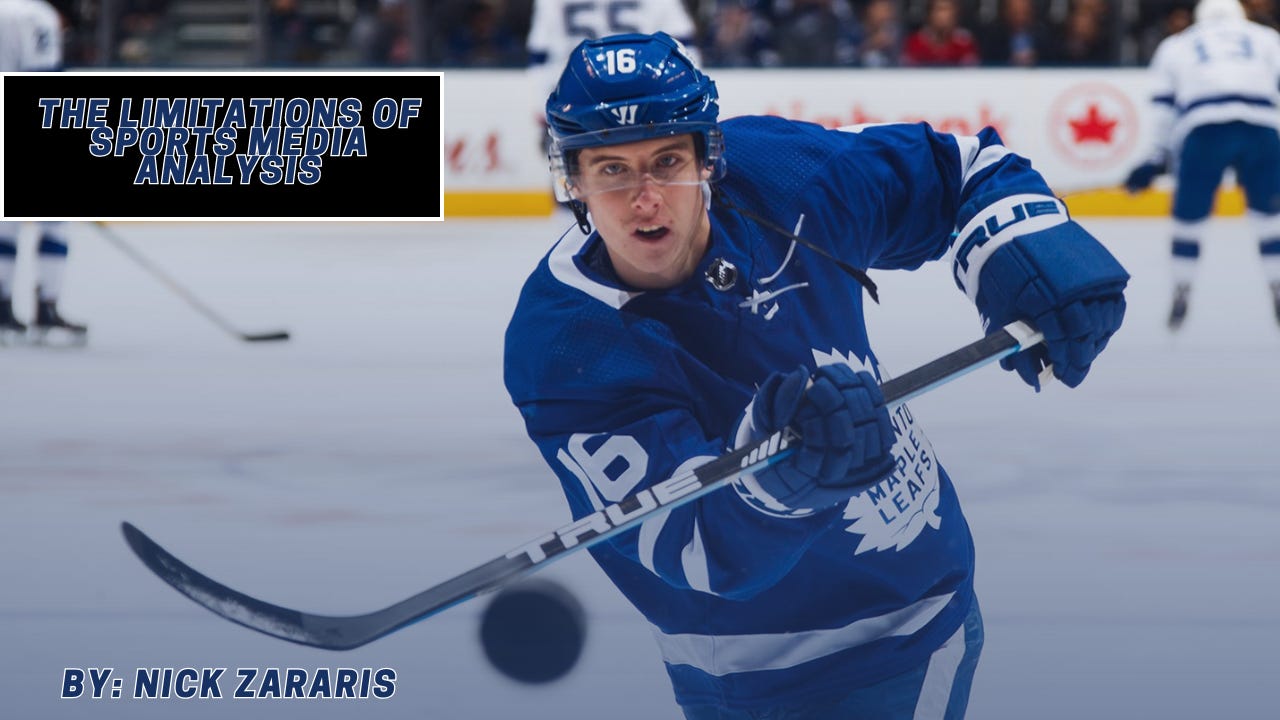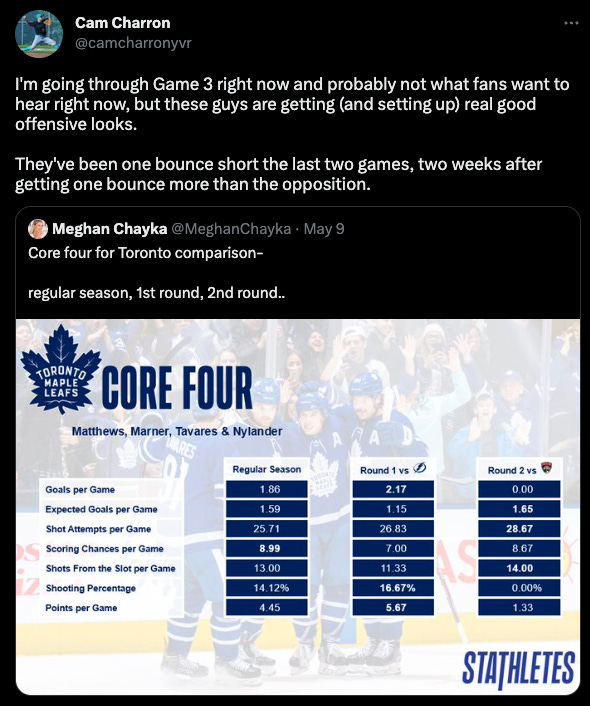As the Toronto Maple Leafs stare down the barrel of a 3-0 series deficit to the Florida Panthers, that locker room has to feel like the loneliest place on planet earth. No matter what impassioned defenses players of the Leafs can muster up, outside it feels as if it’s lip service on the way to the inevitable.
The Leafs getting over the first round hump was a watershed moment. 19 years is a long-time in the professional sports world. That’s multiple GMs, coaches, that’s four average NHL careers. That’s just about a fourth of the average life-span in the United States.
But, naturally, as the Leafs are the star that hockey media orbits the take-artists are warming up to go nuclear as soon as the red light goes on in the studio or on zoom.
Fans who are upset about Toronto’s current predicament, I’m in no position to tell you how to feel. After waiting so long to make the second round, I understand the frustration about falling flat against a team that was inferior during the 82 game regular season.
No, this rebuttal is centered around the sports media monstrosity that cannot explain the nuances of an infinitely complicated game. Hockey is the most high variance sport in North America. The better regular season team wins in the NHL playoffs the least of the four major sports (Baseball, Basketball, Football, hockey).
That high variance nature means that players will play above or below their means.
Hockey rises above the other North American sports because of how volatile goaltending is in comparison to its comparable component in the other sports (pitching in baseball, defense in football and basketball). So much of goaltending is environment dependent and factors out of the net minder’s hands.
I mean think about this:
Boston Bruins: Linus Ullmark, Jeremy Swayman
Florida Panthers: Sergei Bobrovsky, Alex Lyon
Toronto Maple Leafs: Ilya Samsonov, Joseph Woll
Carolina Hurricanes: Frederick Andersen, Antti Raanta, Petr Kochetkov
New Jersey Devils: Akira Schmidt, Vitek Vanecek
Seattle Kraken: Phillip Grubauer, Martin Jones
Dallas Stars: Jake Oettinger, Scott Wedgewood
Minnesota Wild: Filip Gustavsson, Marc-Andre Fleury
Vegas Golden Knights: Laurent Brossoit, Adin Hill
Edmonton Oilers: Stuart Skinner, Jack Campbell
Los Angeles Kings: Joonas Korpisalo, Phoneix Copley
Only 1/4 of the teams in the initial field of 16 played a singular goaltender. The New York Rangers, New York Islanders, Winnipeg Jets and Colorado Avalanche were the four teams that went out on their shield with the best goaltender they had.
The randomness of the NHL playoffs is a feature, not a bug. It’s part of the mythology about Lord Stanley’s Cup. All you have to do is get in…then anything can happen. Part of that mythos is the depth player on a heater, hello Jordon Martinook’s nine points in the Hurricanes/Devils series.
Talking just to talk
But, part of that randomness is a component that sports media fails to address in a logical manner. The present day sports media landscape is a content monster, it needs to be fed all hours of the day, every day of the week. There are no days off if a creator, journalist or company wants to maintain its foothold in the ever worsening landscape.
No authority figure ever wants to admit they can’t explain something. It undermines their expertise and subsequently brings into question the other points they make. That’s what makes the NHL playoffs such a challenge for the sports media content machine.
The personality-centric sports media presentation lends itself to outrageous behavior. Turning oneself into a circus act, screaming, catch phrases and trying to be the class clown.
The clearest manifestation of this convergence of needing to fill airtime with personality centric content is the cliche fest during team autopsies. The former players littered all over talking head panels get to assail the heart and determination of those in the game today infinitely more talented than they ever were.
Reducing a hockey game to “who wanted it more,” is the crutch of an analyst who can’t explain the nuances of the game. Hell, I’d respect an analyst who said “I don’t know,” more than than one launching character attacks at players.
Let’s be frank, these are professional athletes in the best league in the world. Their entire lives were spent working to get to this moment. The work ethic and motivations of a professional athlete should be the last personality trait to come into question.
Watching Mitch Marner get singled out for his playoff shortcomings in a team sport and questioning how much he wants to win are illogical. He’d tell you himself he wishes he was playing better, but to say he isn’t playing well because he doesn’t want to win is just stupidity masquerading as analysis.
Cam Charron of The Athletic Tweeted this on Tuesday and inspired this entire column. The talking heads would have you believe that the Leafs core is wilting under the pressure, that they’re a soft group that’s thrown their hands up and conceded that Florida is going to win so it’s not even worth trying.
Of course, that’s totally disconnected from reality. As the graphic above from data analyst Meghan Chayka shows, the Leafs’ core four of Marner, John Tavares, Auston Matthews and William Nylander is working with a process comparable to the regular season and the first round of the playoffs.
The results just aren’t the same.
That’s why chalking up the Leafs trailing in the series as some type of moral failure misses the mark entirely. The team isn’t playing terribly different from the previous 88 games, but that nuance isn’t compelling television. So, we get character attacks from talking head panels.
Someone has to lose in sports. That’s part of why we watch. Sometimes the losing team contributes to their own demise. Sometimes they just don’t get the bounces required to win. The variance and the drama is part of what makes sports so compelling as a fan.
Instead of highlighting the resurgence of Panthers’ goaltender Sergei Bobrovsky, it’s gotta be the Leafs choking again. The talking heads know the greatest hits album. The Leafs being soft is Cheap Trick playing “Surrender,” three times in a 22 song set. They know what the audience came for.
Going down the rabbit hole
To me, I’ve always taken the superiority complex from talking heads who weren’t particularly successful in their actual hockey careers as insecurity. Guys envious of Marner and Nylander’s all-world skill call them soft when they can’t find the net as a vestige to cling onto the value they brought in their own career.
Saying someone needs to play better or is struggling is entirely fine. When we get to questions of work ethic and determination, those become character attacks pretending to be virtuous. In the hockey community, hard work, machismo, GRIT, are the highest compliments to bestow upon a player.
No one wants to be elite, they want to be gritty. Hockey is the only sport in the world where experts and players alike use “skill it up,” derisively as if it’s a bad thing to be talented.
Naturally, if a player isn’t playing well and a team is losing, it’s easy to go to the sliding scale of compliments and insults and deduce if a team is losing, they must not be exemplifying the most virtuous traits.
This totally ignores the fact that those traits aren’t a mandatory component of success in hockey. There are plenty of gifted players who can get by using their absurd physical gifts. Connor McDavid is the best hockey player on the planet earth and isn’t particularly gritty.
Losing is an inevitable component of sports. Herm Edwards so eloquently said it 21 years ago, “you play to win the game.” Someone has to lose, but chalking up losing as some type of character shortcoming never has and never will make sense to me.
It’s a form of gatekeeping, that because the expert exhibited such traits they must be virtuous and right. The entire nature of talking head panels during intermissions is constructed around personality, that these are the best the network has and they know what it takes to have success regardless of their actual resumes.
Narrowly crediting success to a handful of loosely defined traits is a means for those gatekeepers to insists they know better than everyone else. Only they know what hard work and grit looks like. We non-hockey men wouldn’t understand.
Some parts of hockey are impossibly complicated. Entire libraries could be filled with analysis of goaltending in the NHL playoffs. That’s their beauty.
Most of the public doesn’t interact with sports on a level deeper than whether their team won or lost a given game. The most activated of fans are those who spend their time on social media, aggregating opinions from a variety of sources, forming organic opinions.
That’s why the simplest of rhetoric will persist. Most people don’t actually want to know why something happened. They wanna know who to blame or praise for what happened, not the mechanics in said process.
It’s how players get labeled for their entire careers. It’s why I stick to the statistics and what I can speak to authoritatively in my analysis. Athletes are people, they are not your para-social action figure for you to project your ideal vision of what a role model should be.
They are human beings. Just because they’re living their dream doesn’t mean they don’t have bad days too. So, assailing their character within the context of analysis is doubly as damaging. You’re attacking who they are as people and as competitors.
No, Twitter user LeafsNationbunchofnumbers you don’t care about winning more than the guys on the team. The commitment required to be a professional athlete is not comparable to the rest of us working a normal job. Professional athletes live their job in every decision they make.
Thanks for reading, join the mailing list and get all the best deranged musings as soon as they drop
Trying to analyze something as complex as hockey through simple rhetoric is always going to make one guaranteed loser, the audience.





